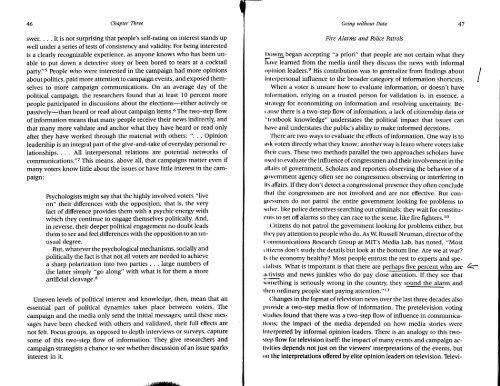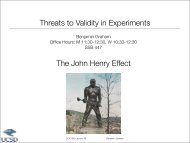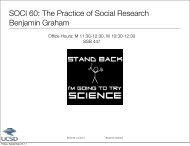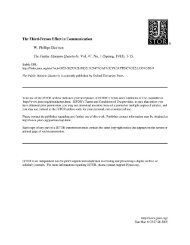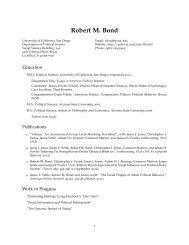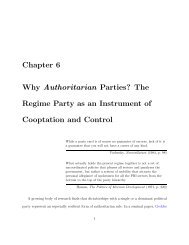Popkin-Reasoning Voter-Ch 3.pdf
Popkin-Reasoning Voter-Ch 3.pdf
Popkin-Reasoning Voter-Ch 3.pdf
Create successful ePaper yourself
Turn your PDF publications into a flip-book with our unique Google optimized e-Paper software.
46<br />
<strong>Ch</strong>apter Three<br />
swer. . . . It is not surprising that people's self-rating on interest stands up<br />
well under a series of tests of consistency and validity. For being interested<br />
is a clearly recognizable experience, as anyone knows who has been unable<br />
to put down a detective story or been bored to tears at a cocktail<br />
party."5 People who were interested in the campaign had more opinions<br />
about politics, paid more attention to campaign events, and exposed themselves<br />
to more campaign communications. On an average day of the<br />
political campaign, the researchers found that at least l0 percent more<br />
people participated in discussions about the elections-either actively or<br />
passively-than heard or read about campaign items.6 The two-step flow<br />
of information means that many people receive their news indirectly, and<br />
that many more validate and anchor what they have heard or read only<br />
after they have worked through the material with others: ". . . Opinion<br />
leadership is an integral part of the give-and-take of everyday personal relationships.<br />
. . . All interpersonal relations are potential networks of<br />
communications."T This means, above all, that campaigns matter even if<br />
many voters know little about the issues or have little interest in the campaign:<br />
Bychologists might say that the highly involved voters "live<br />
on" their diflerences with the opposition; that is, the very<br />
fact of difference provides them with a psychic energy with<br />
which they continue to engage themselves politically. And,<br />
in reverse, their deeper political engagement no doubt leads<br />
themto see and feel differences with the oppositionto anunusual<br />
degree.<br />
But, whatever the psychological mechanisms, socially and<br />
politically the fact is that not all voters are needed to achieve<br />
a sharp polarization into two parties . . . large numbers of<br />
the latter simply "go along" with what is for them a more<br />
artificial cleavage.8<br />
Uneven levels of political interest and knowledge, then, mean that an<br />
essential part of political dynamics takes place between voters. The<br />
campaign and the media only send the initial messages; until these messages<br />
have been checked with others and validated, their full eflects are<br />
not felt. Focus groups, as opposed to depth interviews or suryeys, capture<br />
some of this two-step flow of information. They give researchers and<br />
campaign strategists a chance to see whether discussion of an issue sparks<br />
interest in it.<br />
,,L$iifltl&i',<br />
Gotng without Data<br />
Fire Alarms and Police Patrols<br />
jlrwnq began accepting "a priori" that people are not certain what they<br />
It,tve learned from the media until they discuss the news with informal<br />
u;rittion leaders.e His contribution was to generalize from findings about I<br />
Ittlt'rpersonal influence to the broader category of information shortcuts. I<br />
When a voter is unsure how to evaluate information, or doesn't have<br />
Itrlilrmation, relying on a trusted person for validation is, in essence, a<br />
rltittcgy for economizing on information and resolving uncertainty. Ber'rtusc<br />
there is a two-step flow of information, a lack of citizenship data or<br />
"lt'xtbook knowledge" understates the political impact that issues can<br />
It,rvc and understates the public's ability to make informed decisions<br />
'l'ltere are two ways to evaluate the effects of information. One way is to<br />
rtrk voters directly what they know; another way is learn where voters take<br />
lltcir cues. These two methods parallel the two approaches scholars have<br />
ttst'tl to evaluate the influence of congressmen and their involvement in the<br />
rrll,tirs of government. Scholars and reponers observing the behavior of a<br />
H(tvcrnment agency often see no congressmen observing or interfering in<br />
lls affairs. If they don't detect a congressional presence they often conclude<br />
tlrat the congressmen are not involved and are not effective. But con-<br />
Ht'('ssmen do not patrol the entire government looking for problems to<br />
tolvc, like police detectives searching out criminalsi they wait for constitu-<br />
('nls to set off alarms so they can race to the scene, like fire fighters. ro<br />
(litizens do not patrol the government looking for problems either, but<br />
tlrt'y pay attention to people who do. As W. Russell Neuman, director of the<br />
( lrrrrmunications Research Group at MIT's Media Lab, has noted, "Most<br />
r llizcns don't study the details but look at the bottom line. Are we atwar?<br />
lr llre economy healthy? Most people entrust the rest to expens and sper<br />
l,tlists. What is important is that there are perhaps five percent who'are 4<br />
rtt'livists and news junkies who do pay close attention. If they see that<br />
iffit ing is seriously wrong in the country they sound the alarm and<br />
llrt'n ordinary people start paying attention."r I<br />
(lhanges in the foSmat of television news over the last three decades also<br />
lrtrrvide a two-step media flow of information. The pretelevision voting<br />
cltttlies found that there was a two-step flow of influence in communicalkrtts;<br />
the impact of the media depended on how media stories were<br />
Ittlcrpreted by informal opinion leaders. There is an analogy to this twortelt<br />
flttw for television itself: the impact of many events and campaign actlvltles<br />
depends not just on the viewers' interpretations of the events, but<br />
ntt lhe lnterpretatlons oilered by elite opinion leaders on television.llelevi-<br />
47


